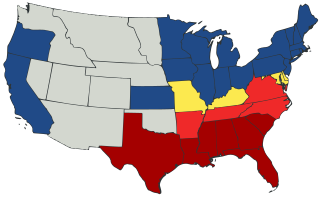While slavery was a major part of it, State vs Federal control was a major part and outlawing of slavery was more of a final straw for the South.
No. That's revisionist history you've been told for years, but it's not true. Here's an article that excerpts several states' Declaration of Causes of Secession, as well as editorials and letters from notable publications and luminaries in the South. The cause was slavery, which was viewed as a moral imperative.
Well, you guys are probably right then. I didn't read the article you linked to, but assuming it contains similar content to the video LSpiro posted, you guys have me mostly convinced.
I remember reading some history of the civil war years ago, how certain soldiers and officers of the Confederate were opposed to slavery, but were loyal to their homeland, and so left the North to fight for the South once war broke out. Specifically, Robert E Lee. This stuck in my mind, though wikipedia says his views may have been a bit more racist than I've read previously.
Specifically, how Lee refused to join the Confederates, though switched sides to defend his home-state once it was clear Virginia would be dragged into a full war.
"I shall never bear arms against the Union, but it may be necessary for me to carry a musket in the defense of my native state, Virginia, in which case I shall not prove recreant to my duty." and "Mr. Blair, I look upon secession as anarchy. If I owned the four millions of slaves in the South I would sacrifice them all to the Union; but how can I draw my sword upon Virginia, my native state?"
So though he may not have been in opposition to slavery as I recalled (apparently, as you point out, from revisionism), he wasn't fighting for slavery, but for his homeland.
For the record, I was born and raised in California pretty much my entire life until just a few years ago, I'm firmly against racism and am not trying to whitewash the civil war, and so my mindset doesn't come from specific Southern sympathies (i.e. "Lost cause") or Southern education. (though I was homeschooled from 5th grade onward - and it was in homeschooling that I read Uncle Tom's Cabin, To Kill a Mockingbird, and Roll of Thunder).
But another thing that sticks in my mind and shapes my thinking is that in almost any war, you can find good people and bad on both sides, and so though I'm on the "winning" side of the war, reading "winning" literature, I try to consider things often from both sides' view.
There's a verse in the Bible that says, "The two kings, with their hearts bent on evil, will sit at the same table and lie to each other, but to no avail, because an end will still come at the appointed time." * - and that's kinda how I feel about most government leaders. Though the leaders of any conflict may both be corrupt, or may be genuinely good people, regardless of motives, nets are cast by war that drag whole nations into conflict, irrespective of the motives of the masses caught up in it (though I don't doubt many of the 'masses' that fought for the south were pro-slavery).
*Note: Though this verse is talking about a 'King of the North' and 'King of the South', I'm not at all trying to claim it's referring to the United State's north and south. It's not.
I'm not at all trying to claim the Confederates should've seceded, or that slavery wasn't a big part (or, as LSpiro and you've pointed out, the primary or only part), only that some of the individuals caught up in it, while their fighting may have directly supported slavery, may not have been fighting for slavery, so much as in defense of their own homes.
And yes, like I've said from the beginning, the flag should certainly not be flown on government grounds. I wish racists wouldn't fly it either, but I don't think banning symbols or speech we don't like is a good route to take.














